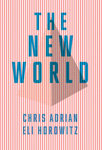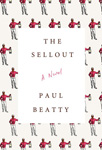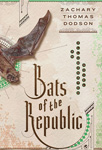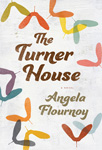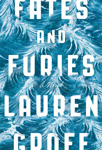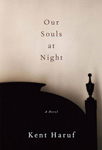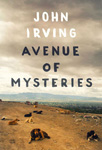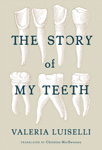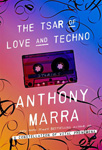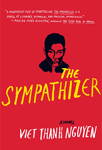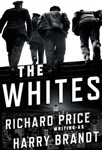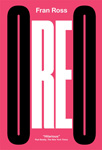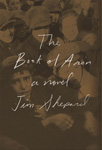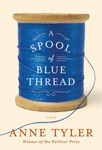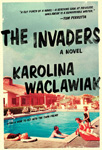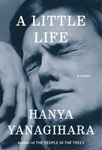by Chris Adrian and Eli Horowitz
Buy it at Powell’s »Doree Shafrir: Like me and probably many if not most of the people in this world, you have probably thought to yourself, more than once, that life is not fair. And indeed, it isn’t! I was very angry for a time that Hurricane Sandy had foiled my chances at running the New York City Marathon in 2012, for which I had been training for the better part of a year. That stroke of misfortune was, inarguably, unfair. Perhaps you have walked into someone’s fancy apartment and wondered how they were able, at the tender age of 28, to purchase said fancy apartment, and then you’ve learned that their mother invented slap bracelets, and it’s just like, well, fuck, what was my mom doing besides raising three kids and working full-time? Unfair.
Anyway. I am here to tell you that no canceled marathon or fancy apartment or, really, anything that you have ever thought was unfair in this world holds even the smallest candle to what the characters in both of these books have been through. I mean, HOLY SHIT, if you thought the first 10 minutes of Up were depressing, do not read these books when you’re PMSing. And even saying that makes me feel like some kind of first-world, fake-problems, out-of-touch baby, because I am not the young Jewish boy in Jim Shepard’s The Book of Aron trying to survive in the Warsaw Ghetto and I have not seen my father and brothers taken away “to work” and my best friends killed. Those aren’t even really spoilers for the book, because if you know anything about the Holocaust and the Nazis, you know that they are not the most joyful people and that shit got real bleak real quick.
Not to brag, but I read The Rise and Fall of the Third Reich when I was in fourth grade and pretty much my dad’s entire family was killed in the Holocaust, so when I started this book, I was kind of like: Well, Jim Shepard, let’s see what you’ve got. Then by the end of the book I was a blubbering mess and had a nightmare that I was trapped in a very Warsaw Ghetto-like environment, so I would say that yes, the book had the desired effect, if that effect was to devastate me emotionally and bring to life through a naive yet world-weary child’s eyes the horrors of the Nazis.
The titular Aron is nine years old and recently moved to Warsaw with his family when the Germans invade and start making everything pretty fucking miserable for the Jews. Still, Aron is a kid, and, even in one of the shittiest situations imaginable, for a time he and his gang manage to have what passes for fun while also smuggling food to their families. The whole thing is pretty much heartbreaking from start to finish; take this description of when he goes to visit his mother, who is dying of typhus, in the hospital:
She said the light hurt her eyes so I went down the hall and switched it off. Some of the patients on the cots and the nurse sitting at the end of the hallway with her paperwork complained, but in the dark I could see my family again, my father in his white holiday shirt and my mother and my brothers and even my younger brother, all of their faces blind to what was coming.
As in this passage, Shepard’s stark, spare prose presents Aron’s perspective incredibly well—and, perhaps more to the point, he never gives Aron a wiseness-beyond-his-years or uses his child narrator as an excuse to engage in the kind of cloying magical realism that infuses books like The Lovely Bones.
Aron ends up in an orphanage for Jewish children run by a psychologist named Janusz Korczak—who really existed and really ran an orphanage for Jewish children in the Warsaw Ghetto—and I don’t want to give too much away, but let’s just say don’t go looking for your Schindler’s List ending. (See? Unfair. Like I said.)
I don’t want to make the case that life is more unfair for the people in Anthony Marra’s book of nine interconnected stories, The Tsar of Love and Techno, but it’s probably fair to say that while I am really thankful that I was not a Jewish resident of Warsaw circa 1939, I am also pretty grateful that, like the protagonist of the first story in the book, I was not a failed artist in the Soviet Union in 1937 whose job it was to airbrush out of photographs and paintings the faces of people who had become enemies of the state and to touch up Stalin’s jowls. It’s just, ultimately, going to be a thankless task, even if you tell yourself that you’ve really nailed how to make Stalin look 10 years younger. Because one day, someone’s going to betray you in the same way you’ve betrayed so many others, and you’re going to be taught Polish while sitting in prison so that you can confess, in Polish, to being a Polish spy (you are not a Polish spy).
Before he’s executed (again, not really a spoiler, because no one arrested for treason in Soviet Russia actually gets out alive—you knew that, right?), though, our narrator managed to paint his dead brother’s face into every painting and photograph he was assigned, and this tiny act of defiance winds through the rest of the stories in various ways. Soon we’re in a prison camp in Siberia, and then we’re in Kirovsk, the town that the prison camp was in, and soon we’re fighting a war in Chechnya.
It was hard to read this book and not wince, repeatedly, at the misery of just about everything. But to give just one example, this is what life in Kirovsk is like:
In the summertime, the devastation of the earth permeated the clouds. Yellow fog enshrouded the city like a varnish aged upon the air. Sulfur dioxide rose from the Twelve Apostles, the dozen nickel smelters ringing a lake of industrial waste. Rain burned our skin. The pollution congealed into a dense ceiling blocking the starlight. The moon belonged to the past our grandmothers spoke of. We made the most of our summers: days without school, nights without darkness. First dates, first kisses. We were so awkward, morning pimples in the mirror, hair where we never wanted it, and we thought of the lung cancer X-ray that was the album art for Surfin’ Safari, considered the ways a body betrays its soul, and wondered if growing up was its own kind of pathology. We fell in and out of love with fevered frequency. We constantly became people we would later regret having been.
I was reminded a bit of Adam Johnson’s The Orphan Master’s Son as I read Love and Techno (Marra studied with Johnson at Stanford, where he had a creative writing fellowship)—there’s a similar matter-of-factness to his writing about the near-absurdity of living in a totalitarian regime—but Marra is masterful at distinguishing the various perspectives from which these stories are told. Everyone has a similar world-weariness; no one is the same.
Everywhere in this book, just when there seemed to be glimmers of love and hope, it all came crashing down in a huge pile of corrupt, bureaucratic dung, and I kept reprimanding myself as I read—like, LOL, silly, there is no hope in Russia, everything there is so hugely fucked and always has been! Everything you care about will be taken away, everyone you love will be killed. конец.
I devoured both of these books, even though I should warn you, do not read them before bed unless you want your dreams populated by executed children and mothers dying horrible deaths from lung cancer. Which, if you do, maybe talk to someone, OK? I didn’t want to have to choose a winner between these two books, because they both fucked me up in different, horrible ways that I hated and yet, because I am an undiagnosed masochist, couldn’t help but love.
But—and I have gone back on forth on this approximately one million times—in the end I gave the slightest edge to The Tsar of Love and Techno, because I loved its stories and its characters just a tiny bit more. And this is the most terrible thing to say about a book about the Holocaust but I will say it anyway: Despite its brilliance and its amazing writing and its wonderful storytelling, The Book of Aron didn’t feel as urgent to me as The Tsar of Love and Techno did. If you think that’s unfair, well, so is life.
Match Commentary
By Kevin Guilfoile & John Warner
John: The Tournament of Books is pretty much designed around the principle of unfairness, which is why we love it, but I think Judge Shafrir illuminates that there is a human cost to all this unfairness.
But isn’t that the point of the tournament, to illuminate what’s underneath the literary prize process? When an author wins a prize I’m certain it’s a great thrill for that individual, but the “losers” (everyone else) are hidden from view. I am a two-time loser of the Pulitzer and National Book Award. I’ve also lost the Thurber Prize for humor and the Story Prize. There’s probably dozens of other prizes I’ve lost and I’m not even aware of it. Considering we co-authored a book, we probably lost a prize or two where we could’ve offered each other condolences, except we never knew we lost, except that also, we didn’t win anything.
To make it worse, we drag this sucker out for a month, and each victory brings with it another chance for “defeat,” though what does that even in mean in the context of a contest that isn’t a contest?
Unfairness heaped upon unfairness with a side order of caprice. I wasn’t aware of the connection between Anthony Marra and Adam Johnson, but it reminds me that the inclusion of The Tsar of Love and Techno in this contest instead of Adam’s National Book Award-winning Fortune Smiles is totally unfair. We almost always include the National Book Award winner in the tournament, but I think we started talking and thinking, yeah…but…Adam Johnson won the ToB already and Fortune Smiles is short stories, which tend to not do well. But we still thought we should include something in the short story vein—on the long list we had Marra’s book, and Lucia Berlin’s book, and Charles Baxter’s book, and J. Ryan Stradal’s book, and then we probably moved on to something else and didn’t think twice about whether or not we were being unfair to Adam Johnson because fair/unfair doesn’t really have anything to do with it. We’re just talkin’ here.
Have you ever been a finalist for something or known that you were in contention, but didn’t win?
Kevin: Probably, but not in a way that would make an interesting story. Matching the right book with the right reader is so difficult. It’s hard to find an agent. It’s hard to find a publisher. It’s hard to find an audience, even a modest one. If you’re lucky enough to get those things, it seems preposterous to then hang your self-validation on anything as random as winning some dumb award.
Now let’s get back to handing out some dumb award.
John: If I had been judge, I would’ve faced the same dilemma as Judge Shafrir because these are two of my favorite reads of the year. Shepard’s skill with the first-person perspective of a child cannot be overstated. The risk of being precious or cloying is extreme, and yet, as Judge Shafrir notes, Shepard never falls into that trap.
This makes the book not a particularly pleasant reading experience. There is no sanitizing of experience. Aron is young, but he is not naive.
Kevin: It’s interesting that A Little Life has received so much more attention for its infliction of unattainable degrees of misery on an impossible character. But maybe it’s not so surprising. Yanagihara’s book distances us from what happens to Jude by placing it in an allegorical context. Shepard doesn’t let us off the hook that way. The legacy of the Holocaust is that the only reason it was not impossible is that it happened. It’s a difficult lesson to process, and even more difficult, as time goes by, to remember.
When American presidential candidates start holding propaganda rallies disguised as campaign events sparked with the rhetoric of fascism, and elected officials speak nostalgically about internment camps, it’s clear we aren’t doing enough remembering.
John: Shepard has achieved this feat before, with a less-noted work, Project X, which is an exploration of a Columbine-like event through the eyes of one of the killers. It was released in 2003 as a young adult book, some years before the explosion in wider interest in crossover YA titles, but it’s both a sympathetic and chilling look at teenage pathology.
Now that it’s been invoked, I can also see similarities between Anthony Marra and Adam Johnson. Both have a very sly humor running underneath much of their work, even as their characters may inhabit ruined lives. The story “The Grozny Tourist Bureau” from the collection is a case in point. The narrator is tasked as the head of the bureau to help revitalize the “most devastated” city on the planet. The present of the story plays as comedy, while the past is slowly revealed and we see the depths of the devastation.
My only criticism of Marra’s work is one that I leveled at Redeployment in a previous tournament. Occasionally, the stories are a little too well-made, too aware of themselves as examples of the literary short story, and I feel like I can see the moves coming from a mile away.
This may be what we call a “me” problem, though.
Kevin: I have a “me” problem, as well, which is that I often struggle with short-story collections. I actually like short stories (I have even written some), but I don’t usually like to read them back to back to back. I like short stories in magazines (where they are harder and harder to find) more than I like them in books. George Saunders is one of my favorite writers, but it might take me six months to read one of his collections. (Part of that is an intentional postponing of gratification, but it’s mostly because I know I will enjoy his stories more if I spread them out.) Connected short stories are a special problem when I try to read them this way. By the time I finally get around to reading the last one, the threads that connect it to the first story are often hard to recover. For a collection of connected short stories to really win me over, the stories often have to be so closely connected you might as well call it a novel. (See A Visit From the Goon Squad or Cloud Atlas for two Rooster-winning examples.)
I like Anthony Marra a great deal, and I enjoyed the stories in this book, but in order to get the book read in time for this commentary I read them all backs-together and received the expected diminishing returns. Honestly if you asked me which stories I liked the best, I would probably say “Granddaughters,” followed by “The Grozny Tourist Bureau,” followed by “The Leopard,” followed by “A Prisoner of the Caucus,” otherwise known as “The second one, the third one, the first one, and the fourth one.” Maybe I need to take your class so you can teach me how to read smarter. Or with a more open heart.
That’s my own particular battle, but I wonder why short stories aren’t more popular, generally? The market for them is vanishingly small, and many short-story collections are published as the second book following a popular debut. A publisher can capitalize on the success of a bestselling first novel (and the author can fulfill the terms of a two-book contract) by collecting that writer’s short stories, often written in grad school, while they work on the next novel. If it wasn’t for two-book deals, we would probably have a third as many short-story collections, at least from big publishers. The demand for them just isn’t there.
You and I have talked about the decline of the short story a lot, and I don’t think anyone has ever gotten their hands around it. I’d like to hear more about this from the commentariat, especially folks who regularly read novels, but not short stories. Why not?
Speaking of unfairness (or at least we were some time ago), remember last week when a book by one of America’s finest writers, Anne Tyler, was forced to participate in a play-in contest just to make the shortlist for our stupid cockfight? Tomorrow, novelist Daniel Wallace will name a victor as A Spool of Blue Thread takes on one of the strangest books in this year’s competition, Valeria Luiselli’s The Story of My Teeth.

The official 2016 Tournament of Books T-Shirt by book designer Janet Hansen. Order yours!


